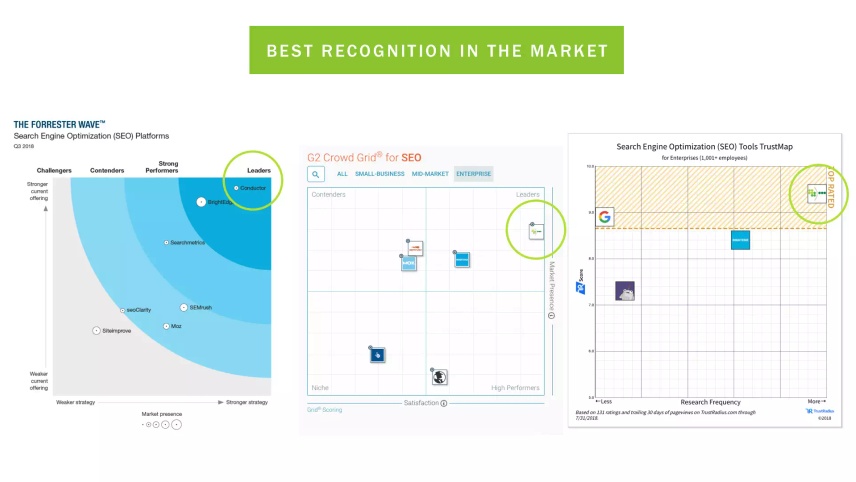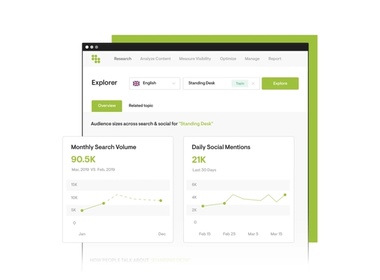What is an SEO Platform? Understanding SEO and AEO
SEO platforms aren't just rank trackers anymore. They've evolved into unified hubs that help you show up in both traditional search and AI-powered answer engines like ChatGPT. Whether you're trying to figure out the difference between tools and platforms, understand the four types of SEO, or evaluate which platform is right for your team, we'll walk you through what actually matters.
An SEO platform is marketing technology that helps you manage, implement, and measure your brand's presence in organic search. But these platforms have evolved way beyond traditional rankingsRankings
Rankings in SEO refers to a website’s position in the search engine results page.
Learn more. Today's platforms are organic marketing and AI visibility suites designed to secure your brand's authority and answers across traditional search engines, Answer Engines (AEO), and Large Language Models (LLMs) like ChatGPT.
A good SEO platform gives you a complete view of your website's strengths, weaknesses, opportunities, and threats. Understanding what these platforms offer (particularly their AI-driven insights and structured dataStructured Data
Structured data is the term used to describe schema markup on websites. With the help of this code, search engines can understand the content of URLs more easily, resulting in enhanced results in the search engine results page known as rich results. Typical examples of this are ratings, events and much more. The Conductor glossary below contains everything you need to know about structured data.
Learn more analysis) helps you choose the right one and make sure it aligns with what your brand actually needs.
The value of organic visibility is becoming impossible to ignore. Organic search delivers over half of all trackable website traffic, and users click through at higher rates on organic results than paid media. Now, AI and Answer Engine Optimization (AEO) are reshaping how search works. Your content needs to be structured so you become the definitive, cited source for direct answers. When you consider that a relevant organic presence influences 39% of all purchasers, it makes sense why more enterprises are investing in comprehensive SEO platforms that can handle both traditional search and the emerging world of AI visibility.
Understanding SEO platforms: The shift to AI visibility
Most marketers use SEO platforms for traditional Search Engine Optimization (SEO) and content strategy. But these platforms have evolved into something bigger: Organic Visibility & Intelligence Hubs that deliver value across your entire marketing ecosystem. They're now a key source of audience and AI interpretation intelligence that impacts way more than just rankings.
The best platforms give you insights into audience behavior and AI model preferences across trends and topics that affect:
- Local foot traffic
- Online visibility & Share of Voice (AEO/GEO metrics)
- Paid search (PPC/SEO alignment)
- PR & Brand Reputation (Monitoring AI citations)
- Product launches
- Sales & Lead Velocity
- Website traffic
- And more
If you're looking to level up your organic marketing, you need a modern platform that supports the entire search ecosystem. Your platform should work as both a system of record for site changes and technical integrity and a source of AI-driven insights and structured content opportunities that maximize your visibility in direct answers and LLM responses.
Why SEO is important for business
SEO gets your business in front of your target audience when they're actively searching for what you offer. It drives qualified organic traffic to your most important pages and helps you show up in both traditional search results and AI-generated answers.
Not ranking where you need to be on Google? Your content isn't gaining visibility in ChatGPT or other AI assistants? Your SEO needs to be dialed in. Understanding how SEO works and why it matters helps you see the real business impact.
SEO brings visibility where your customers are searching
When you understand what your audience is searching for and how they're asking questions, you can create content that actually satisfies their needs. Your customers get a great experience moving from search (whether that's Google or an AI assistant) to your site, finding exactly what they were looking for.
An effective SEO strategy helps your content rank higher and become more visible across all search surfaces. Better visibility means more qualified visitors who are ready to engage with your business.
SEO helps you win customers before your competitors do
When someone searches for a product or service you offer, they'll go to your competitor if you don't show up. Ranking high in search results and getting cited by AI models means you reach potential customers at a critical moment in their buyer's journey, before they even consider the competitionCompetition
Businesses generally know who their competitors are on the open market. But are they the same companies you need to fight to get the best placement for your website? Not necessarily!
Learn more.
Why an SEO platform makes the difference
Choosing new technology isn't easy, but the value an SEO platform brings to your business makes it worth the investment. Forrester, the leading independent market research firm, put it plainly: an SEO Platform is a must for every in-house SEO team.

A platform gives you the unified data, AI-powered insights, and workflow automation you need to drive real results across traditional search and emerging AI channels. Individual tools force you to piece together insights manually. A platform connects the dots and shows you exactly where to focus for maximum impact.
The four types of SEO: Building your foundation
You need all four types of SEO working together to show up where your audience is searching. Here's what each one does and why it matters for both traditional search and AI-powered answer engines.
1. On-page SEO
This is everything you control on your web pages. You're optimizing content to rank higher and attract the right visitors. But on-page optimization has evolved beyond keywords. Your content needs to be structured so AI models can easily extract answers and cite you as a source.
What matters most:
- Title tags and meta descriptions that work for both search engines and AI summaries
- Header tags that organize your content with a clear hierarchy
- Content that actually answers what people are searching for
- Internal links connecting related topics
- Structured data (Schema.org) so AI understands your content
- Optimized images with descriptive alt text
- Clean, descriptive URLs
2. Off-page SEO
This is your reputation across the web. When authoritative sites link to you and mention your brand, it signals to search engines and AI that you're worth paying attention to. With AI-powered search, getting cited by authoritative sources matters even more for proving your expertise.
What matters most:
- Backlinks from high-authority sites in your industry
- Brand mentions across the web
- Social signals showing your content resonates
- Guest posts that showcase your expertise
- Digital PR positioning you as an authority
- Strategic partnerships
- Active reputation management
3. Technical SEO
This is the foundation that makes everything else possible. If crawlers can't efficiently access and understand your site, your content won't rank, no matter how good it is. As AI models get better at parsing website content, technical excellence has become non-negotiable.
What matters most:
- Fast site speed (Core Web Vitals are a ranking factor)
- Mobile-first design that works perfectly on phones
- XML sitemaps and robots.txt files
- HTTPS security
- Proper crawlability so search engines can find your pages
- Structured data for rich results
- JavaScript rendering optimized for AI crawlers
- Clean canonical tags and redirects to avoid duplicate content
4. Local SEO
This gets you visible when people search for businesses like yours nearby. With AI-powered local search and voice queries on the rise, local optimization is critical if you serve specific geographic areas or have physical locations.
What matters most:
- Optimized Google Business Profile with accurate information
- Consistent local citations (keep your NAP the same everywhere)
- Local keywords that match how people search in your area
- Customer reviews and active reputation management
- Local backlinks from community sites
- Location-specific landing pages
- Local schema markup
- "Near me" search optimization for voice and mobile
How to start SEO for beginners: A step-by-step guide
New to SEO? You don't need to master everything at once. Here's a practical roadmap to get you started, focused on what matters in today's AI-powered search landscape.
Step 1: Conduct keyword and topic research
Before you write anything, figure out what your audience is actually searching for. Modern keywordKeyword
A keyword is what users write into a search engine when they want to find something specific.
Learn more research isn't just about finding popular terms. You need to understand conversational queries and the questions people ask AI assistants like ChatGPT.
Here's what to do:
- Use keyword research tools to identify search terms your audience cares about
- Figure out search intent (are people looking for information, trying to buy something, or searching for a specific site?)
- Find question-based queries that match what your audience wants to know
- Map keywords to your buyer's journey so you're meeting people where they are
- Check out "People Also Ask" boxes for content opportunities
- Think about voice search patterns (people talk differently than they type)
Step 2: Optimize your website's technical foundation
Amazing content won't help if search engines and AI crawlersCrawlers
A crawler is a program used by search engines to collect data from the internet.
Learn more can't access your site. Get your technical foundation solid before you invest heavily in content creation.
Focus on these priorities:
- Speed up your site (nobody waits for slow pages)
- Make sure your site works perfectly on mobile devices
- Add HTTPS security (it's a ranking factor and builds trust)
- Create and submit XML sitemaps to search engines
- Fix broken links and crawl errors
- Set up Google Search Console and analytics so you can track what's working
- Add structured data where it makes sense
- Clean up your site architecture so visitors can find what they need
Step 3: Create high-quality, AI-ready content
Content is still king, but the rules have evolved. You're writing for both human readers and AI models that pull information for direct answers. Your content needs to be comprehensive, well-structured, and genuinely helpful.
What makes content work today:
- Answer user queries completely (no shallow content)
- Use clear headers that break up your content logically
- Include definitions, examples, and actionable steps
- Demonstrate real expertise and experience (E-E-A-T matters)
- Write compelling title tags and meta descriptions
- Link to related content on your site
- Format content so it's easy for AI to extract key information
- Keep content fresh with regular updates
Step 4: Build your site's authority
Google and AI models trust sites that other authoritative sources trust. Building that authority takes time, but it's worth the effort. Focus on earning quality backlinksBacklinks
Backlinks are links from outside domains that point to pages on your domain; essentially linking back from their domain to yours.
Learn more and building your brand's reputation.
How to build authority:
- Create content worth linking to (original research, comprehensive guides, useful resources)
- Look for guest posting opportunities on reputable sites
- Build relationships with industry publications and journalists
- Monitor where your brand gets mentioned across the web
- Encourage satisfied customers to leave reviews
- Run digital PR campaigns to get your brand in front of the right audiences
- Participate authentically in industry forums and communities
Step 5: Track, measure, and optimize
SEO isn't set-it-and-forget-it. You need to watch what's working, spot opportunities, and keep improving. Use data to make smart decisions about where to focus your efforts.
What to monitor:
- Track keyword rankings in both traditional search and AI-powered results
- Watch your organic traffic, conversions, and how people engage with your content
- Figure out which content performs best so you can create more like it
- Find striking distance keywords (ranking on page 2) for quick wins
- See where AI models are citing you
- Run regular SEO audits to catch issues early
- Stay on top of algorithm changes and how AI search is evolving
- Consider an SEO platform to pull everything together and guide your strategy
Starting with individual SEO software can work, but a unified platform often saves time and delivers better results. A good platform gives you integrated insights, AI-powered recommendations, and workflow automation that helps you avoid costly mistakes and see results faster.
What are SEO tools? Are they worth it?
An SEO tool is technology that gives you data and guidance to create content that actually performs. These tools help you optimize your website, identify what topics your audience is searching for, and measure how your website performs in organic search.
Individual tools can be valuable depending on what you need. The right approach comes down to how much time you're willing to invest, your SEO experience level, and what your business actually needs. Tools give you more ownership over your insights and data, help you get your organic marketing program off the ground, and scale with you as your needs grow.
But here's the reality: managing multiple tools takes significant time and expertise. You're manually connecting insights from your rank tracker, technical audit software, content optimizer, and analytics. Then you need to figure out how to optimize for AI search on top of traditional search. For many teams, a unified platform that connects all these dots makes more sense than juggling individual tools.
What is the difference between an enterprise SEO platform and SEO tools?
As a digital marketer, you're pulled in a million directions. One of the biggest benefits of an SEO platform over individual tools is getting a complete view of your website's business value at enterprise scale, especially as AI reshapes how search works.
Enterprise SEO platform
An Enterprise SEO platform gives you the big picture of your SEO performance while letting you dig into granular insights when you need them. Even if you had access to the top 10 SEO tools on the market, you wouldn't get the same value as a unified platform.
Enterprise platforms bring together data from multiple sources to tell the complete story of your website's value and performance. They're designed to deliver insights not just to your search marketing team, but to everyone across your organization (even those who aren't SEO experts). This ensures your team maximizes the impact of search intelligence company-wide.
What enterprise platforms help you do:
- Innovation with AI-powered insights: Get creative ideas for campaigns and discover keywords you wouldn't find manually. AI can surface opportunities based on how audiences search in AI-powered engines like ChatGPT and traditional search, finding ways to turn searchers into customers.
- Automation at scale: Aggregate massive datasets into reports sent weekly, monthly, or quarterly. You'll save countless hours compiling raw data into readable formats. AI automation can also generate content briefs, identify technical issues, and prioritize actions based on business impact.
- Integration across channels: Align strategies between teams using all digital marketing channels. Track your visibility not just in traditional search, but across AI Overviews, answer engines, and LLMs. Campaigns succeed when everyone works toward team goals, not individual ones.
- AI-ready optimization: Structure your content so it performs in both traditional search and as a cited source in AI-generated answers. Enterprise platforms help you optimize for E-E-A-T signals, structured data, and the conversational queries people use with AI assistants.
Looking to expand beyond traditional SEO? Modern brands need to combine SEO with AEO to show up in AI-powered search. Check out our guide to The 10 Best AEO / GEO Tools in 2025: Ranked and Reviewed to see which tools can help you optimize for ChatGPT, Perplexity, and other AI answer engines.
SEO tools
Good SEO tools offer specialized analysis of particular data points that affect your search engineSearch Engine
A search engine is a website through which users can search internet content.
Learn more rankings. For instance, free SEO tools provide related keywords for keyword research. This data can be valuable for specific optimizations, but only if you have the time and expertise to use it well.
How you can use SEO tools:
- Measure current performance
- Uncover technical site issues
- Discover content opportunities
- Research customer needs
- Find new keywords and topics to guide content creation
- Explore original research to grow your skills
- Present leadership with the financial impact of SEO and content
The challenge? Individual tools give you pieces of the puzzle. You're manually connecting insights from your rank tracker, technical audit software, content optimizer, and analytics. Then you need to figure out how to optimize for AI search on top of traditional search. An enterprise platform connects all these dots for you, with AI-powered recommendations that consider both traditional and AI-powered search visibility.
How to evaluate an SEO platform
SEO has evolved into a critical strategy that influences your business decisions. You need an SEO platform to measure and report on your efforts across both traditional search and AI-powered answer engines. Here's what to look for.
What core features and tools make the best AI-powered SEO platform?
The best SEO platform empowers you to understand and satisfy your customers' needs, including the needs of AI and Answer Engines. Look for platforms that offer:
- Smart recommendations: Prioritize SEO and AEO actions with the most impact on your goals
- Audience intelligence: Understand your audience and their conversational query patterns
- Competitive insights: Track competition for keyword rankings and who AI models are citing across ChatGPT, Perplexity, and other answer engines
- Complete visibility: Monitor SEO visibility and your Share of Answer in AI Overviews
- Content analysis: Evaluate content performance and its readiness for AI extraction
- Content activity reporting: Automatically connect search visibility, AI citations, activity tracking, and analytics to prove ROI
- AI-ready optimization: Optimize for structure, definitions, and E-E-A-T signals
- Meaningful reporting: hare wins and AI mention velocity across your organization with customizable templates, widgets, and dashboards
- Workflow efficiency: Save time with AI-powered automation for content briefs and technical diagnoses
- Cross-team collaboration: Enable all team members, regardless of SEO or AEO/GEO fluency
Remember: Customer support matters too. The best platforms combine powerful features with support that empowers your team. You're not just buying a platform—you're choosing a partner invested in achieving your holistic digital visibility goals.
Need a deeper dive into how different platforms stack up? Check out our comprehensive guide: The Best AI Visibility Platforms: Evaluation Guide. We evaluate platforms across key criteria to help you make an informed decision.
Which platform is best for SEO?
There's no one-size-fits-all answer. The enterprise SEO platform space includes players like Conductor, Botify, and BrightEdge, each with different strengths. The best platform for you depends on your specific needs, team structure, and budget.
That said, here's what sets platforms apart and why it matters:
Data integration matters: Some platforms force you to jump between 45+ isolated reports. Look for platforms that unify search data, technical insights, content analytics, and performance metrics in one view so you can actually see the complete picture.
AI quality varies wildly: Not all AI is created equal. Some platforms just repackage ChatGPT. Others (like Conductor) integrate years of SEO success data with your specific website, market position, and brand voice to create content that actually stands out and performs.
Enterprise-grade doesn't mean complicated: The best platforms are built for complex organizations (multi-domain management, role-based reporting, real-time alerts) but remain accessible to your entire digital team, not just SEO specialists.
Pricing transparency matters: Some platforms hide pricing behind sales calls or charge per-seat fees that balloon as you grow. Look for transparent pricing and meaningful trial periods so you can test before committing.
Want to see how Conductor compares to specific platforms? Check out our detailed comparisons:
- Conductor vs. BrightEdge
- Conductor vs. Semrush
- Conductor vs. seoClarity
- Conductor vs. Botify
- Conductor vs. Siteimprove
- Conductor vs. Lumar
Why teams choose Conductor
Conductor is one of TrustRadius's top-rated SEO platforms and a G2 Crowd Leader because we solve the problems other platforms create. Instead of forcing you to jump between 45+ isolated reports, we bring search data, technical insights, content analytics, and performance metrics together in one platform.
Our AI doesn't just repackage ChatGPT—it integrates 10+ years of SEO success data with your specific website, market position, and brand voice to create content that actually ranks and converts.
We're built for complex organizations that need multi-domain management, role-based reporting, and real-time alerts, but we've designed the platform to be accessible to your entire digital team (not just SEO specialists).
Get started with a 3-week free trial that includes full platform access, with no surprise fees or per-seat charges that balloon as your team grows.








